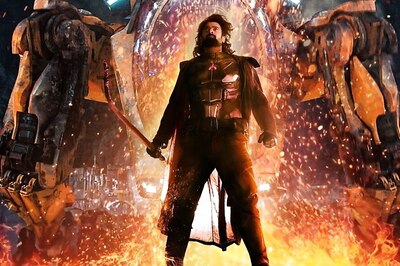
views
A Democratic National Convention like no other began on Monday, with politicians trading raucous cheers in a crowded arena for speeches delivered from quiet locations across the country because of the coronavirus pandemic.
Here are four takeaways from the first-ever virtual convention’s opening night:
DEMOCRATS’ ‘BIG TENT’
Much of this week’s convention will be about showcasing the cultural and racial diversity on which the Democratic Party prides itself.
But the program, especially Monday’s lineup, had another endgame: demonstrating what the Democrats hope is a “Big Tent” of political ideology, as well.
At one time, it would have been unthinkable for a former Republican presidential candidate such as John Kasich to appear at a Democratic convention to urge his party’s faithful to vote against their own leader.
The former Ohio governor’s speech on Monday night in support of presumptive Democratic nominee Joe Biden underscored how Republican President Donald Trump’s handling of the coronavirus, his scorched-earth rhetoric and his disinterest in appeasing detractors have turned off some members of his own party.
The speeches by Kasich and other Republicans amounted to an invitation to moderates that the Democratic Party can attend to their interests.
In an era of extreme partisan polarization, it is a tall order to ask longtime voters of one party to change sides. But Trump’s deep unpopularity has given Democrats an opportunity, and they are trying to take full advantage ahead of the Nov. 3 election.
SANDERS ALL IN
If Kasich’s appearance was intended to draw independents and moderate Republicans to Biden’s side, Senator Bernie Sanders’ speech was aimed at a different audience entirely: the restless progressive wing of the Democratic Party that views Biden with deep skepticism.
In 2016, the divisions within the party were on prime-time display at the convention, when Sanders supporters booed Democratic nominee Hillary Clinton after a bitterly fought primary season left both sides angry.
But Sanders made clear on Monday he was fully behind Team Biden. While acknowledging he and Biden do not agree on everything, he portrayed Trump as an existential threat to American democracy and offered a full-throated endorsement of his former rival for the nomination.
“The price of failure is just too great to imagine,” Sanders said.
The absence of conflict may make for a less exciting convention, but Democratic officials are breathing a sigh of relief that they are avoiding a repeat of 2016.
RACIAL JUSTICE
Democrats devoted much of Monday night to racial justice, a topic they believe is a major liability for Trump.
The family of George Floyd made a somber appearance, asking viewers to engage in a moment of silence for the Black man whose death in police custody in Minneapolis in May set off months of nationwide unrest. In her remarks, former first lady Michelle Obama attacked Trump for responding to the phrase “Black Lives Matter” with “derision.”
Trump has sought to turn the issue to his advantage, portraying protesters as violent anarchists and declaring himself the “law-and-order” president. In Minneapolis on Monday, he did not mention Floyd, instead attacking the city’s Democratic mayor for allowing demonstrators to “destroy” citizens’ lives.
But Democrats intend to press the matter – and polls suggest most Americans trust Biden, not Trump, to improve race relations.
EMPATHY
Biden’s supporters have spent much of the presidential campaign touting his empathy, long seen as a core strength for a man who lost his first wife and infant daughter in a car accident and a son to brain cancer.
On Monday, they laid out one of their central arguments for the presumptive nominee – that he, unlike Trump, has the ability to console Americans hurting from a trio of crises unnerving the country: the coronavirus, the economic downturn and civil unrest over racial injustice.
The convention’s first night was interspersed with testimony from regular people who are suffering – a small-business owner, a farmer, a nurse and mother. Biden’s virtual panel on racial justice allowed undecided voters to see him engaged and committed to working on issues critical to the party.
Michelle Obama, perhaps the party’s most beloved figure, sought to draw the sharpest distinction between Biden and his opponent, saying that instead of leadership and comfort, Trump provided only “chaos, division and an utter lack of empathy.”
Disclaimer: This post has been auto-published from an agency feed without any modifications to the text and has not been reviewed by an editor




















Comments
0 comment